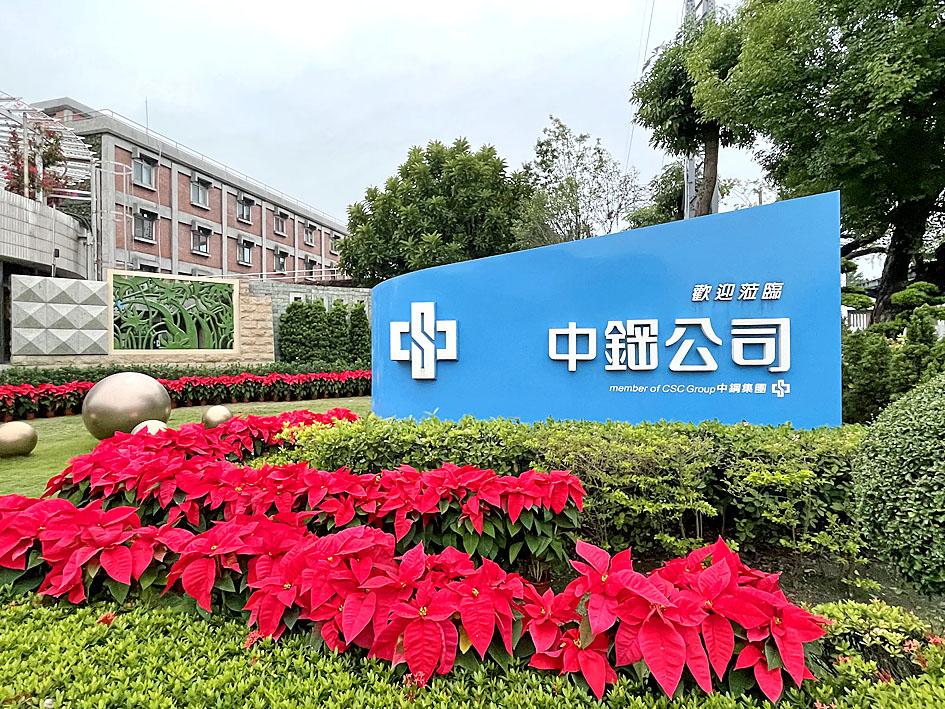China Steel Corp (中鋼), the nation’s largest steelmaker, yesterday said that it would raise steel prices by 2.44 percent on average for shipments next month, as local customers accelerate inventory buildup amid improving demand during the high season.
The company is taking its cue from global peers, which have raised steel prices in response to improving demand from the construction and auto industries, as more countries gradually open their economies and plan to roll out new infrastructure projects in the second half of this year.
China’s Baowu Steel Group Ltd (寶武鋼鐵) and Angang Steel Co (鞍山鋼鐵) have raised domestic steel prices by between 200 yuan and 400 yuan (US$31.55 to US$63.11) per tonne for delivery next month, China Steel said in a statement.

Photo: CNA
That was the first price increase in eight months by the Chinese mills, the statement said.
Formosa Ha Tinh Steel Corp (台塑河靜鋼鐵興業) in Vietnam also raised prices for hot rolled steel and steel rods by US$90 and US$40 per tonne respectively in its latest price quotes, the statement added.
“The global steel industry’s fundamentals are improving with the arrival of the high season, leading to an acceleration in downstream buildup,” China Steel said.
“Global steel prices are returning to an upswing this year, fueled by higher manufacturing costs and better demand,” it said.
In Europe, steel demand has also picked up significantly, benefiting from a regional auto industry recovery, it said.
ArcelorMittal SA has secured long-term supply agreements with European automakers, with prices increasing by between 30 and 50 euros per tonne for its hot rolled steel and cold rolled steel plates, the statement said.
“A rebound in March is a turning point, indicating that the steel industry is moving toward an uptrend into the busy second quarter,” the Kaohsiung-based company said.
Global steel supply is moving in the opposite direction, as some Japanese and South Korean steel mills have cut production following the closure of several steel furnaces, China Steel said.
Chinese steelmakers have scaled down production to comply with Beijing’s restrictions on carbon emissions during the Beijing Winter Olympics, it said.
Increases in manufacturing costs are adding pressure to steelmakers, given record-high prices of iron ore, the major raw material for steel manufacturing, at about U$150 per tonne lately and metallurgical coal prices rising to about US$440 per tonne, China Steel said.
China Steel is raising steel prices by between NT$500 and NT$800 per tonne, following three straight months of cuts.
The prices of hot-rolled steel plates and coils, as well as cold-rolled steel coils, are to rise by NT$800 per tonne next month, while the price of hot-dipped galvanized coils used in construction is also to climb NT$800 per tonne, and that the price of hot-dipped galvanized coils used in home appliances and computers is to increase by NT$500 per tonne, the company said.
The prices of electro-galvanized coils and electrical steel sheets are to advance by NT$500 per tonne next month, it added.

Semiconductor business between Taiwan and the US is a “win-win” model for both sides given the high level of complementarity, the government said yesterday responding to tariff threats from US President Donald Trump. Home to the world’s largest contract chipmaker, Taiwan Semiconductor Manufacturing Co (TSMC, 台積電), Taiwan is a key link in the global technology supply chain for companies such as Apple Inc and Nvidia Corp. Trump said on Monday he plans to impose tariffs on imported chips, pharmaceuticals and steel in an effort to get the producers to make them in the US. “Taiwan and the US semiconductor and other technology industries

CHIP WAR: Tariffs on Taiwanese chips would prompt companies to move their factories, but not necessarily to the US, unleashing a ‘global cross-sector tariff war’ US President Donald Trump would “shoot himself in the foot” if he follows through on his recent pledge to impose higher tariffs on Taiwanese and other foreign semiconductors entering the US, analysts said. Trump’s plans to raise tariffs on chips manufactured in Taiwan to as high as 100 percent would backfire, macroeconomist Henry Wu (吳嘉隆) said. He would “shoot himself in the foot,” Wu said on Saturday, as such economic measures would lead Taiwanese chip suppliers to pass on additional costs to their US clients and consumers, and ultimately cause another wave of inflation. Trump has claimed that Taiwan took up to

A start-up in Mexico is trying to help get a handle on one coastal city’s plastic waste problem by converting it into gasoline, diesel and other fuels. With less than 10 percent of the world’s plastics being recycled, Petgas’ idea is that rather than letting discarded plastic become waste, it can become productive again as fuel. Petgas developed a machine in the port city of Boca del Rio that uses pyrolysis, a thermodynamic process that heats plastics in the absence of oxygen, breaking it down to produce gasoline, diesel, kerosene, paraffin and coke. Petgas chief technology officer Carlos Parraguirre Diaz said that in

Japan intends to closely monitor the impact on its currency of US President Donald Trump’s new tariffs and is worried about the international fallout from the trade imposts, Japanese Minister of Finance Katsunobu Kato said. “We need to carefully see how the exchange rate and other factors will be affected and what form US monetary policy will take in the future,” Kato said yesterday in an interview with Fuji Television. Japan is very concerned about how the tariffs might impact the global economy, he added. Kato spoke as nations and firms brace for potential repercussions after Trump unleashed the first salvo of